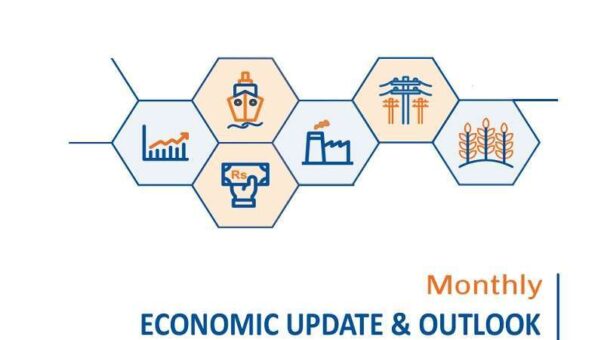Pakistan’s economy is still facing significant challenges, with high inflation and a slowdown in economic activity. Persisting risks to the fiscal side are consequent to below the target set for the first nine months of the current fiscal year.
According to the Monthly Economic Update and Outlook for April 2023, uploaded by the Finance Ministry on Saturday, under these circumstances, the government has a daunting task to follow effective revenue mobilisation and cautious expenditure management strategy to end the current fiscal year with a substantial decline in the fiscal deficit compared to last year.
Although the Federal Board of Revenue’s tax collection showed growth of 18%, it remained below the target set for the first nine months of the current fiscal year, owing to a slowdown in domestic economic activity and import compression. On the expenditure side, higher policy rates at domestic and global levels have attributed to higher markup payments, despite reducing non-markup spending.
Headline inflation (CPI) is expected to remain at an elevated level in the coming months as its key drivers are food and energy price hikes. Currency depreciation and rising administered prices have contributed to a rise in the overall price level. Although the SBP is enacting contractionary monetary policy, inflationary expectations are not settling down. The inflation is expected to remain in the range of 38-38 per cent for April 2023.
The performance of the auto-industry also remains subdued due to massive increases in input prices, tightening auto finance, and import restrictions. The decline in local cement dispatches was even more significant, with a drop of 28.7%. However, there was a positive aspect with an uptick in export shipments.
During the Kharif 2023, availability of inputs regarding seeds, agriculture credit, and fertilisers will remain satisfactory. But, the Pakistan met department has informed that slightly above-normal rains are expected in the next three months (April-June, 2023). The seasonal rainfall may provide water for crops in the main rain-fed areas, while lower parts of the country will remain slightly deficient during the season of Kharif.
The net federal revenues increased by 32% to Rs3,133 billion during July-February 2023, against Rs2,374 billion in the same period of last year following a 36% growth in non-tax revenues. The increase in non-tax collection is primarily due to higher revenues from the petroleum levy, higher receipts from markup payments, dividend, the PTA profit, passport fees, royalties on oil/gas, and others have also contributed to a substantial increase in non-tax revenues during the first eight months of the current fiscal year.
On the other hand, total expenditure grew by 11.5% to Rs5,815 billion during July-February 2023 as compared to Rs5,214 billion in the same period last year. Current expenditures grew by 16.3% to Rs6,629 billion for the period against Rs4,794 billion during July-February 2022. Within the current, expenditure on markup payments grew by 69%.
The fiscal deficit stood at 2.8% of GDP during July-February 2023 as opposed to 3.4% of GDP for the same period of last year, while primary balance posted a surplus of Rs781 billion (0.9% of GDP) during July-February 2023 against a deficit of Rs399 billion (-0.6% of GDP) last year, owing to a decline in non-mark-up expenditures. The trend in MEI during the first nine months of the current fiscal year remained volatile on account of high inflation, high-interest rates, fiscal consolidation, and lack of confidence in economic agents.
One of the indicators mentioned is the Large Scale Manufacturing (LSM) index, which is highly influenced by external conditions and has been recorded below its natural capacity level. This suggests a slowdown in the industrial sector.
The government has increased the stipend under the Benazir Kafaalat initiative, which provides financial assistance to vulnerable segments of society, such as children affected by malnutrition and pregnant and lactating women under the Benazir Nashonuma initiative.
The balance of payment (BoP) data shows a decline in the trade deficit in goods and services, remittances, exports, and imports. However, foreign direct investment (FDI) and total foreign investment have also declined significantly compared to the same period of the previous fiscal year.
The Public Sector Development Program (PSDP) grants to provinces have decreased compared to the same period of the previous fiscal year, while agriculture credit and credit to the private sector have increased.
Headline inflation in Pakistan to hit historic high at 36.5% in April 2023
